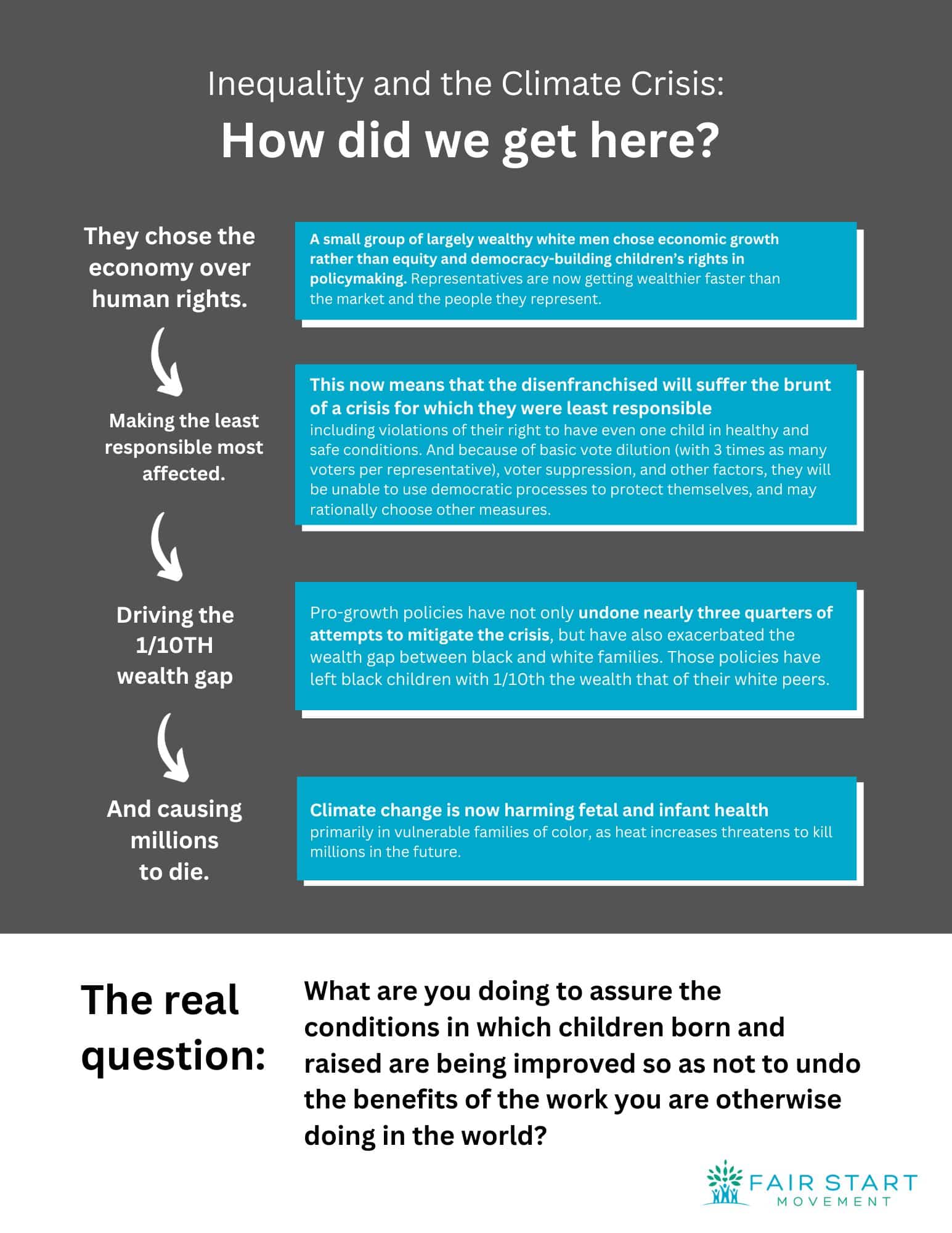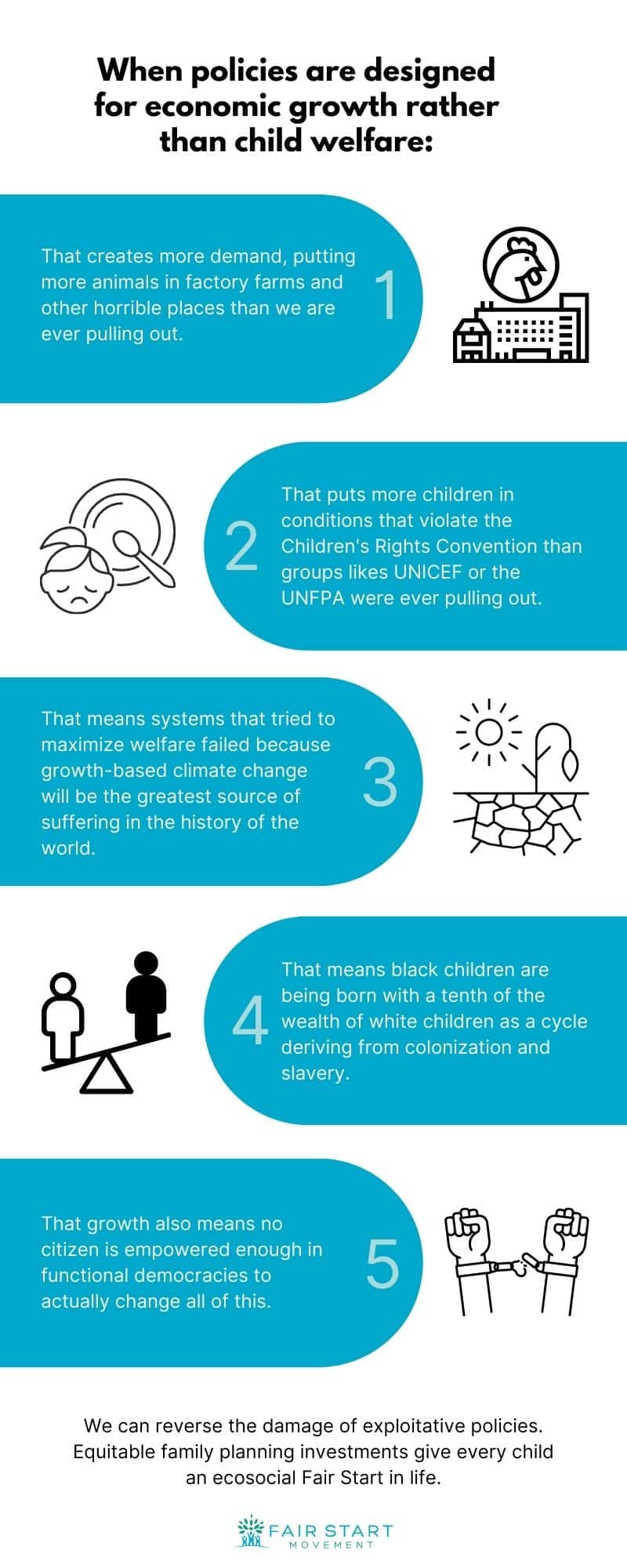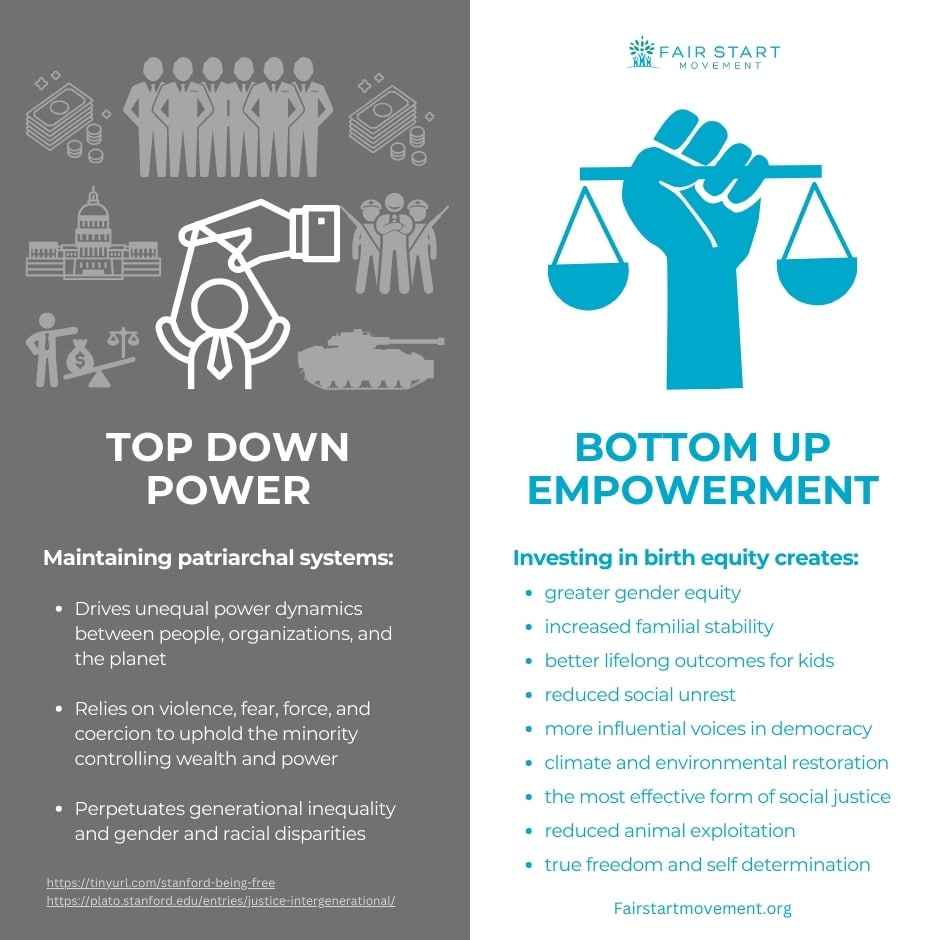What are five good reasons to give all kids a fair start in life?
- We should not harm others, and basic unfairness in how we have children does that.
- There is a way to reduce the harm we are causing.
- Reducing harm to others also liberates each one of us.
- There are specific targets blocking these reforms.
- There are concrete moves we can all make now.
We should not harm others: Birth positionality, or the conditions in which we are born and raised, can result in our benefitting at deadly cost to others – with climate mitigation efforts being undone with failed child welfare policy. For example, those born in wealthy nations with high levels of consumption harm the ecologies of children born in more vulnerable nations, or children that will be born decades into the future. Given that we are before we do, that creational harm to mothers and infants is the first baseline for any evaluation of harm/costs and benefit, and the way we are limiting the freedom of others.
We can test for that harm by looking at the claims we make, like Stanford’s use of the term “sustainable,” and asking whether we were accounting for the impact of the basic policies we accept on children’s rights – things like the Children’s Rights Convention – when making the claim. Is their claim accurate relative to a zero baseline?
There is a way to reduce the harm we are causing: Basing the legitimacy of legal and political systems on children’s rights, specifically climate and biodiversity restoration through ecosicial birth equity transfers, is the most just and effective way to offset this harm because who we should be is always the primary question in ethics and cost/benefit analysis, and logically begins with children’s rights or what creators owe those they create. That is why freedom, or self-determination is always relative; we are created by others.
There is no justified or constitutive “we” to orient from, no right/obligation/ought from which government could legitimately assign property rights, etc. without starting at children’s rights which logically precede human rights. We are obligated to each other before we are obligated to those in governance who should merely represent us, not rule over us. Using zero baseline modeling or children’s rights is like other ideals, e.g., free speech, in that we don’t have to and will rarely achieve the ideal. But it can be the way we orient our lives and obligation, regardless.
Not starting with children’s rights is fallacious. Temporally, children’s rights precede human rights, with the former obligation enabling the latter; each adult’s rights would have started with their rights as a child. The fallacy derives fundamentally from religion, and the idea that being born poor and positioned to serve the wealthy was an act of god or some other equally subjective source. Given the primacy of procreative justice, the threat of the climate crisis, and the idea that we have a right and maybe a duty to defend others from gave harm, young women would have greater justification to use coercion to obtain protective resources for their future children than the government would have to use coercion to block them. Their claim is primary, the most effective way to save lives in the climate crisis, focuses on aiding the most vulnerable, and involves the most numerous category of entities – those who will live in the future. Government is only representative to the extent it derives from conditions that lead to relative self-determination, and because of the climate crisis and for many other reasons we do not have that today.

Reducing harm also liberates: Current baselines for legitimacy start with permitting the exploitation of birth positionality in a way that caused the climate crisis. This contravenes the promise of dignity in the Universal Declaration of Human Rights, which logically begins with the birth and development conditions – children’s rights – that actually position us (with high levels of fairness-based trust, for example) to constitute free nations. Most of the academics in these debates contradict in their writings the basic values they exhibited throughout their lives, e.g., seeking minimum thresholds of personal welfare, expecting equal access to opportunities, participating in and adhering to political/legal systems that purported to represent the governed, using and enjoying an environment relatively conducive to human and nonhuman health, enjoying a right to have a child in relatively safe conditions, etc.
Liberation requires ecocentrism, While all things humans do are anthrocentic to a degree, we can choose systems of political obligation that orient from the nonhuman world, or the relative absence of human power. That orientation solves what may be the political conundrum of our time – this misunderstanding of freedom as personal autonomy, rather than political equity to create valuable autonomy which can be measured though values we all share. Where else would the “We” that begins and legitimates political constitutions come from? There is no other source.
The genesis of that misunderstanding and the illusion of freedom is the idea that having children is more self-determining for the parents than other determining for the children and explicitly base it on parental choice and not child equity (and equity as in equal and influential shares in a democracy).
We are obligated to follow the law, on any theory of political obligation, because it is supposed to come from social sources and be objective, or inclusive of its subjects, which would be mean we offset each other’s capacity to make the rules equally as we grow, which in turn sets optimal population ranges for organizations formation and dissolution. That enables the trust in and respect for others democracy requires because it means we invested in a common core, through birth and development, that we all share and that makes us inclined to share power rather than grab it. Democracy or choice among political equals is physically impossible without that offset, without making room for other voices rather than dominating the podium. But right now in the U.S. we do the opposite of the offset, which is a form of white supremacy, and mostly because the UN has failed to take human rights seriously. To the extent those defending the policies rely on growth-based population ethics, they are wrong.
Most of those policies relied on the wrong climate models and permitted emissions now likely to kill many. Those policies also treat growth as a futuristic or long-run issue, ignoring that our current system has droves of children dying at the hands of their parents every day. Those policies also start with the persons promoting them benefitting from a coercive system of political obligation that will kill many in the future, the legitimacy of which was based on an illusion of inclusion as discussed above.
Effectuating a new obligation/baseline could involve an AI-based sovereign tribunal designed to decolonize the future through birth-equity entitlements – ensuring bottom up justice rather for the most vulnerable, rather than top own systems of coercion. The process could move from eurocentric models like the UN, towards noneurocentric ones. Such an all animal rights-based or truly constitutive baseline would avoid the mistakes that created the climate crisis (including the conceptual separation of humans from their ecologies), and any derivative tribunal would have primary jurisdiction because , for all the reasons given above.

There are specific targets blocking these reforms: The baseline-enabled growth that created wealth is now set to do more harm – killing hundreds of millions in the years to come – than the philanthropy built on growth-based wealth did good. That’s an existential crisis for a massive industry. Climate change is now harming fetal and infant health harm, primarily in vulnerable families of color, as heat increases threaten to kill millions in the future. Roughly three quarters of attempts to mitigate the crisis has been undone by pro-growth policies, policies that exacerbated the one-tenth wealth gap between black and white families. This is happening because a handful of largely wealthy white men chose economic growth as the baseline for policymaking, rather than equity and democracy-building children’s rights that would actually legitimate – through inclusivity – nation-states. They chose to exploit a false sense of autonomy to exchange participatory democracy for economic growth.

It’s not just about growth-based emissions. This involves the role of many nonprofit’s in concretizing the mindset that is normal to bring children into the world without the resources things like the Children’s Rights Convention guaranteed them, and all so that they would become cheap labor to ensure more growth. Children die at the hands of their parents every day because of this system. This could have been any one of us. That’s not ok. You can’t get to an ought, an obligatory legal system, not that non-ought.
Creating lots of workers and consumers, homo economicus, rather than fewer empathetic and democratically influential citizens, homo democritus/legalis, by definition illegitimates political systems and authorizes the taking of wealth from those whom most benefited from the illegitimacy. The wealth is owed to those most harmed.
I was obligated by funders I worked with to omit the fact that family policies were undoing the progress we claimed, and putting countless at risk. The leadership chose to maintain unjust systems at deadly cost to others, even when some gave their lives to try to change these systems. Maintaining their positionality came above all else.
I had one funder tell me that “fair start” sounded like ensuring their grandchild would be born in hospital conditions like those in Kampala, rather than in Palo Alto, and they wanted to avoid that, even though they had made their wealth and contributed to policies that created ecological costs for Uganda and had ensured their daughter would be the executive director of their foundation. They did this all while using that same money to decoy audiences away from equity, and towards geoengineering solutions that would make them a savior in the climate crisis.
Many wealth funders driving nonprofits, who benefited by evading child rights-based legitimacy, are using wealth they made at cost to others to avoid this reform in order to ensure massive and unearned privileges for their children. They undercuts freedom, and legitimate or duty-creating systems, because they treat others as means and not ends and in a system that fundamentally racist and ecocidal. This turns our freedom into their power, with concentrations of wealth and power built by the greenwashed evasion of children’s rights. There are various ways to test for this, including the way these funders use their wealth to amplify their voice over others, or how many would interact with them in person. One cost of this system? Seemingly random acts of mass violence are of often driving by the shooters’ feeling of personal disempowerment, and of an unjust system, but they kill innocents rather than those who benefitted the most from their structural predicament.

There are concrete moves we can make now: Ensuring this birth-equity based reform would simply mean prioritizing current investments in young women as the first and overriding human right, escalating the payments and pegging them to parenting readiness and delay, and structuring them around birth equity defined as an equal and influential role in setting the rules of one’s democracy – testable by seeing how we offset each other’s voices, the extent to which legal systems require coercion, etc. The assessments can be done through ESG reporting requirements, and certification programming.
By defining greenwashing based on the harm it actually caused, taking a full account of the various levels of harm, and using greenwashing litigation settlements to high-profile role model birth-equity based entitlements as the first human right, we can ensure the highest form of justice.
Many are already changing course.
We can always start with this question: What are we doing to assure the conditions in which children born and raised, including their environment and role models, are being improved so as not to undo the benefits of the work we are otherwise doing in the world?
By asking this question you are looking for policy scam that fundamentally created the climate crisis. You are looking for the deadly omission of information about the impacts those making claims about public benefit are actually having. You are looking for those who are willing to benefit by exploiting those children’s birth positionality for economic growth, thus benefitting at deadly cost to others. You are looking those who choose a fundamental political system/orientation system with no functional protections for children, and thus none for the ecologies those children would consume. A classic example of this are funders backing the sale of vegan food products as a form of animal rights because they are invested in the companies that produce them, even when the family and growth policies they rely on does exponentially more harm to animals (and humans) than their food advocacy does good.
Take action: Ask this question.

